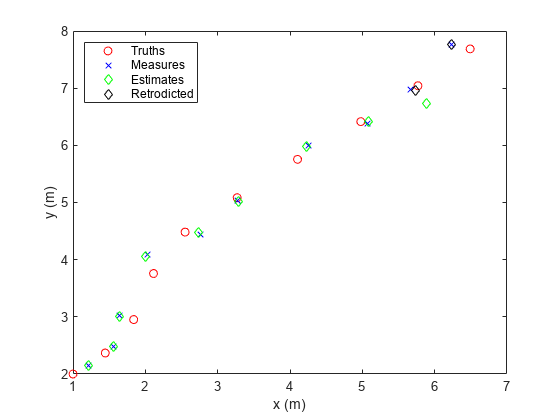retrodict
Description
The retrodict function performs retrodiction, predicting
the state estimate and covariance backward to the time at which an out-of-sequence measurement
(OOSM) was taken. To use this function, specify the MaxNumOOSMSteps
property of the filter as a positive integer. After using this function, use the retroCorrect or
retroCorrectJPDA
function to update the current state estimates using the OOSM.
[
retrodicts the filter by time retroState,retroCov] = retrodict(filter,dt)dt, and returns the retrodicted state and
state covariance. The function also changes values of the State and
StateCovariance properties of the filter object to
retroState and retroCov, respectively.
Additionally, if the filter is a trackingIMM, the
function also changes the ModelProbabilities property of the
filter.
[___,
also returns the status of the retrodiction retrodictStatus] = retrodict(___)retrodictStatus as
true for success and false for failure. The
retrodiction process can fail if the length of the state history stored in the filter
(specified by the MaxNumOOSMSteps property of the filter) does not
cover the request time specified by the dt input.
Examples
Input Arguments
Output Arguments
More About
References
[1] Bar-Shalom, Y., Huimin Chen, and M. Mallick. “One-Step Solution for the Multistep out-of-Sequence-Measurement Problem in Tracking.” IEEE Transactions on Aerospace and Electronic Systems 40, no. 1 (January 2004): 27–37.
[2] Bar-shalom, Y. and Huimin Chen. “IMM Estimator with Out-of-Sequence Measurements.” IEEE Transactions on Aerospace and Electronic Systems, vol. 41, no. 1, Jan. 2005, pp. 90–98.
Extended Capabilities
Version History
Introduced in R2021b
See Also
retroCorrect | trackingKF | trackingEKF | objectDetectionDelay
